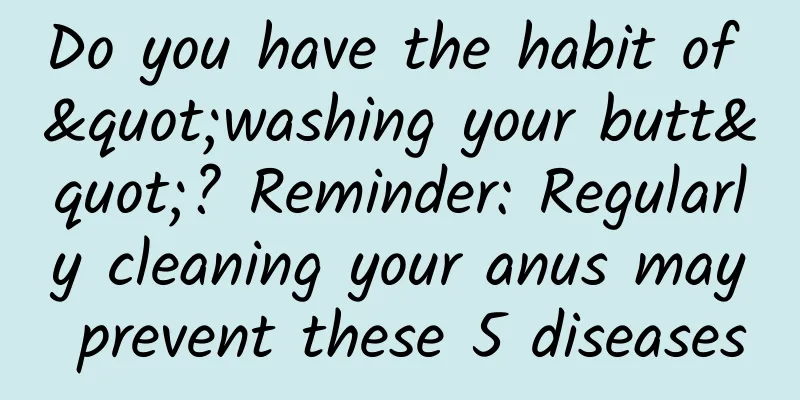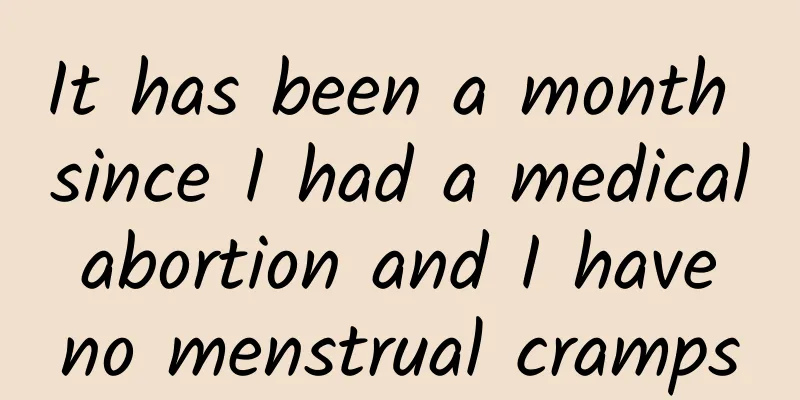Do you have the habit of "washing your butt"? Reminder: Regularly cleaning your anus may prevent these 5 diseases

|
Let me tell you a real case. Mary is a career elite who is busy and often works overtime until late at night. She always complains about itching and odor in her private parts from time to time, which makes her feel embarrassed at work and in social situations. Until a physical examination, she was told that she had mild vaginitis. After a series of treatments, I gave her a seemingly simple but extremely important suggestion-cleaning the anal area thoroughly every day. At first, Mary was puzzled by this, but after persisting for a few weeks, she was pleasantly surprised to find that those annoying symptoms gradually disappeared and her quality of life was greatly improved. Mary's experience is not an isolated case. In fact, cleaning the anal area is essential for preventing many gynecological diseases. Dear ladies, have you ever had this experience: after a busy day, you lie in bed tiredly, but toss and turn because of itching or discomfort in your private parts? Maybe you think it's just a trivial matter, but as an experienced gynecologist, I want to tell you that it may be that you have neglected a small hygiene habit in your daily life-that is, regular anal cleaning. Yes, you heard it right. It is the "butt washing" habit that you may be ashamed to talk about, but is crucial. You may not know that this simple action can actually become an invisible shield to protect your private health and prevent at least five common gynecological diseases. First, let’s look at the possible consequences of not paying attention to anal cleansing. Have you ever suffered from vaginitis? That unpleasant itching, odor, and even pain may be caused by bacteria spreading from the anal area to the vagina. Regular cleaning can greatly reduce this risk. Secondly, cervicitis is also a problem for many women. Did you know? If you do not pay attention to the hygiene of the anal area, harmful bacteria such as E. coli may ascend through the reproductive tract and cause cervical inflammation, which may even affect fertility in severe cases. Let’s talk about pelvic inflammatory disease, a serious gynecological disease that is time-consuming and painful to treat. Its occurrence is often closely related to personal hygiene habits. Keeping the anal area clean can effectively reduce the chance of bacterial infection and thus prevent the occurrence of pelvic inflammatory disease. Also, have you ever worried about the hygiene of your sexual life? Hygiene problems during sex are also one of the important causes of urinary tract infections and sexually transmitted diseases. Cleaning the anal area can reduce these risks to a certain extent. Finally, we have to mention hemorrhoids. Sitting for long periods of time, irregular diet, and not paying attention to anal hygiene can all lead to the occurrence of hemorrhoids. I believe that anyone who has experienced hemorrhoids will deeply understand the pain it brings. So, dear ladies, don't ignore this little move anymore. Spending a few minutes every day to gently clean the anal area with warm water can not only make you feel refreshed and comfortable, but more importantly, it can help you build a strong line of health defense. Of course, there are also some things to pay attention to when cleaning. So, how to perform effective anal cleaning? Here are some professional suggestions: Choose the right time: It is best to do it when taking a shower every day to ensure the overall cleanliness of the private parts. Use warm water: Warm water is the gentlest cleanser and will not damage your skin's natural oil layer. Gentle Wipe: Use your hands or a soft cotton towel to gently wipe the anal area, avoiding rubbing. Avoid Chemical Ingredients: Unless recommended by your doctor, try to avoid soaps or body washes that contain fragrances or other harsh chemicals. Drying: After cleaning, gently pat the anal area dry. Keeping it dry helps prevent bacterial growth. Dear ladies, let us no longer neglect this simple yet crucial hygiene habit. The daily "clean buttocks" plan is not only a care for yourself, but also a commitment to your health. So, besides cleaning the anus, what other ways are there to prevent gynecological diseases in daily life? In addition to anal cleaning, there are many ways in daily life to help prevent gynecological diseases: Develop good hygiene habits: for example, wash your hands before going to the toilet and do not use dirty toilet paper; When wiping the vulva after defecation, it is advisable to wipe from front to back; Wash your vulva every day, change your underwear and hang it in a ventilated place to dry; Use your own basin and towel for your own use; Wash underwear and socks in different basins. Balanced diet: Make sure to consume enough fruits, vegetables and protein-rich foods every day to provide the body with the nutrients it needs and enhance immunity. Regular exercise: Regular exercise can improve blood circulation and metabolism, and reduce the risk of certain gynecological diseases. Develop a reasonable exercise plan based on your own situation, such as performing moderate to high-intensity training at least 3 times a week. Avoid overuse of antibiotics: Overuse of antibiotics may lead to the emergence of drug-resistant strains, making treatment more difficult. Do not abuse antibiotics unless necessary, follow your doctor's prescription and complete the entire course of treatment. Regular gynecological examinations: Regular gynecological examinations can help detect, diagnose and treat potential diseases at an early stage. It is recommended to have a comprehensive gynecological examination at least once a year, including cervical cancer screening. Pay attention to personal hygiene: Maintaining personal hygiene helps prevent bacterial infections and inflammation. In daily life, you should take a bath frequently, change your underwear, and keep your private parts clean and dry. Remember, health is no small matter. Starting today, let us develop good personal hygiene habits, stay away from the troubles of gynecological diseases, and embrace a healthier and more confident life! |
Recommend
What is the reason for brown discharge from cervical erosion in women? Two factors can cause cervical erosion to occur.
Everyone should know that under normal circumstan...
How to treat acute cervicitis? 3 dietary therapies can treat acute cervicitis
Acute diseases generally need to be treated well....
Tests for pelvic peritonitis
Pelvic peritonitis is very common for many women....
How much do you know about the dangers of uterine fibroids?
Uterine fibroids, as the name suggests, are a typ...
Inflammation caused by gynecological diseases can easily turn into vulvar leukoplakia
The occurrence of gynecological diseases such as ...
Cost of treating Bartholinitis
What is the cost of treating Bartholinitis? The m...
The presence of these 5 characteristics indicates high prolactin
Prolactin has the function of promoting breast de...
Let's learn about the symptoms of acute pelvic inflammatory disease
Pelvic inflammatory disease mainly refers to the ...
Eat zongzi healthily without gaining weight: 5 principles to wrap zongzi
Eat Zongzi during Dragon Boat Festival and you wo...
How to relieve the symptoms of dysmenorrhea, nausea and dizziness How to relieve dysmenorrhea, dizziness and nausea
Dysmenorrhea is one of the common problems many w...
Will uterine fibroids affect life expectancy?
Will uterine fibroids affect life expectancy? In ...
The safe limit of ractopamine in beef is 10ppb
The Food and Drug Administration of the Departmen...
What are the dangers of having an abortion? How should women take care of themselves after an abortion?
In modern society, people are becoming more and m...
How to treat congenital absence of vagina
Can congenital absence of vagina be treated? Expe...
The weight loss effect is doubled! 4 foods to eat before exercise
As the weather gradually warms up and we start to...






![[Video version] To lose weight, you must first understand whether you are really fat or just puffy! Teaching the secret of slimming](/upload/images/67dcf84a4bc73.webp)


